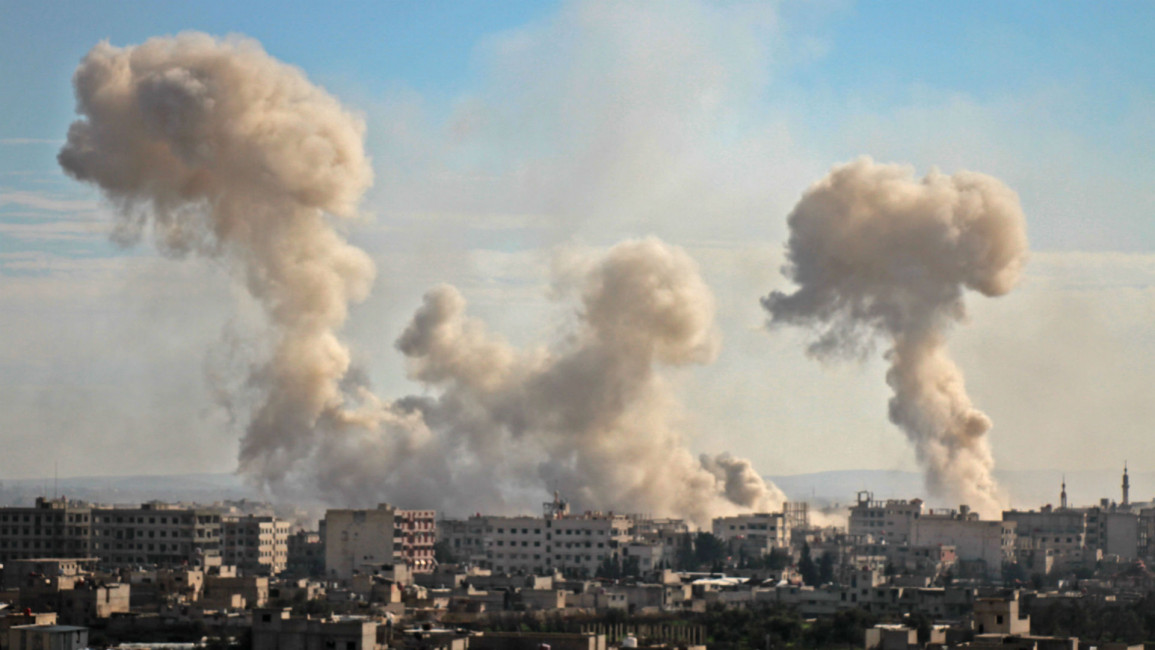
Eastern Ghouta's doomed ceasefire
In theory, in the middle of a ruinous civil war, a ceasefire is held to be a good thing. Ceasefires are meant to herald a cessation of hostilities. During the ensuing period, there ought to be a lull in violence; in this interval the dead can be buried, the wounded can be tended to, the ill given aid, and the hungry fed.
That's the theory. In Syria, ceasefires mostly mean the opposite. When applied to this conflict, the very word is a misnomer. Fire does not cease; there is no lull in violence.
The most recent United Nations-mandated ceasefire in Syria, which was meant to last thirty days and was affirmed by a Security Council resolution adopted two days ago, has not held. It was put into place to stop the carnage in Eastern Ghouta, where, in the past week, hundreds of civilians have been killed in airstrikes carried out by the regime of Bashar al-Assad and its allies.
That violence has continued, unabated.
Over the weekend, the regime intensified its air campaign. Dozens of people have been killed since the Security Council resolution. The regime has continued its bombing of Ghouta, possibly supplementing the usual high explosive with the use of chlorine gas, according to observation by the Syrian American Medical Society.
The UN maintains that the ceasefire must be enforced and that it must hold. This assertion has already been proven false. Now official insistence from António Guterres, the UN secretary-general, that this violence can cease seems not only quixotic, but wilfully blind.
That the violence continued is tragic but unsurprising. Something can be learnt from it. It is both necessary and salutary to assess the reasons for the failure of this ceasefire.
The regime and its allies treat the UN with usurious contempt. It is to be ignored if its pronouncements cannot be hijacked. When the UN condemns regime war crimes, or attempts to establish culpability for chemical attacks which were likely carried out by the regime, it is denounced by the regime's representatives with Russian and Iranian backing.
The verdicts of the UN, when they are critical of the regime, are disdained.
 |
Russia's place on the Security Council also allows Russian diplomats to propagate conspiracy theories which play into the regime's propaganda |  |
This situation is exacerbated by Russia's place as one of the permanent five members of the UN Security Council. This gives Russia a platform to deny regime wrongdoing at every turn, with Russia's representatives refusing to acknowledge the possibility of regime culpability for war crimes.
Its place on the Security Council also allows Russian diplomats to propagate conspiracy theories which play into the regime's propaganda - for example suggesting that civilian first responders, such as the volunteer White Helmets who rescue civilians from the aftermath of regime air attacks, are really al-Qaeda sympathisers, or even active agents of the terror group.
More destructive than this is the effective procedural power that Security Council membership confers on Russia. It allows the Russian state to veto every proposed Security Council resolution that attempts to halt the crimes of the regime.
This necessarily means that every UN effort which is able to attract Russian endorsement must contain some concession to regime interests. Security Council resolutions backed by Russia must, therefore, either assist the regime directly, or be in some way open to manipulation for regime benefit. Any UN measure relating to Syria which can be endorsed by Russia is either meaningless or actively pernicious.
The text of resolution 2401, which was intended to begin a period of ceasefire, must be viewed through this lens.
It is a deeply flawed resolution, and effectively allows the regime and its allies a free hand.
An essential error is one of specificity: the resolution does not dictate the dates of the ceasefire. This is partly born of UN weakness. It lacks both the arbitrary power and the moral force to insist that combatants lay down their arms between specified dates. But the lack of even a gesture in that direction irreparably weakens the resolution.
This ceasefire, weak as it is, is also full of exemptions. It contains great leniency, allowing for the continuation of hostilities in circumstances which may seem reasonable, but which constitute a series of loopholes. The resolution allows for the continuation of violence against the forces of the Islamic State group (IS) and the al-Qaeda-led insurgent coalition Hayat Tahrir al-Sham (HTS) - in the document, HTS is referred to by an earlier name, the Nusra Front.
 |
The ceasefire was doomed to fail before it began. That it was acceptable to Russia meant it was unenforceable from the beginning |  |
IS can be declared to be everywhere, as the Turks have found in Afrin. That is bad enough. But since the regime and Russia and Iran maintain that Ghouta is an al-Qaeda enclave, this allows the regime to continue its campaign of extreme violence without the need to change stories. Beyond even this, there is a final get-out clause. The resolution stipulates that violence can continue against "all other individuals, groups, undertakings and entities associated with terrorist groups".
This is qualified by the suggestion that these "terror groups" must be identified by the Security Council itself, but this is a fig-leaf. Russia, a member of the Security Council, has form here. Russia retroactively classes almost every target of its bombing as "terrorist", and has done since the beginning of its intervention in Syria in 2015. That label has been applied, most recently, to those killed in Ghouta. That simply will not change now.
Resolution 2401 and the ceasefire it was meant to bring about comprise an exercise in futility. The ceasefire was doomed to fail before it began. That it was acceptable to Russia meant it was unenforceable from the beginning.
If the United Nations truly wished to prevent the regime's crimes, it would take a different tack entirely. The wider world knows by now that the regime cannot be induced to limit its atrocities by placation or be persuaded by consensus. Instead, its crimes can only truly be countered by the threat of real punishment and the possibility of serious punitive action.
Unless crimes of this nature are identified and punished, they will continue to occur. Any ceasefire which is not underwritten with that threat is worthless by default.
James Snell is a writer whose work has appeared in numerous international publications including The Telegraph, Prospect, National Review, NOW News, Middle East Eye and History Today.
Follow him on Twitter: @James_P_Snell
Opinions expressed in this article remain those of the author and do not necessarily represent those of The New Arab, its editorial board or staff.




